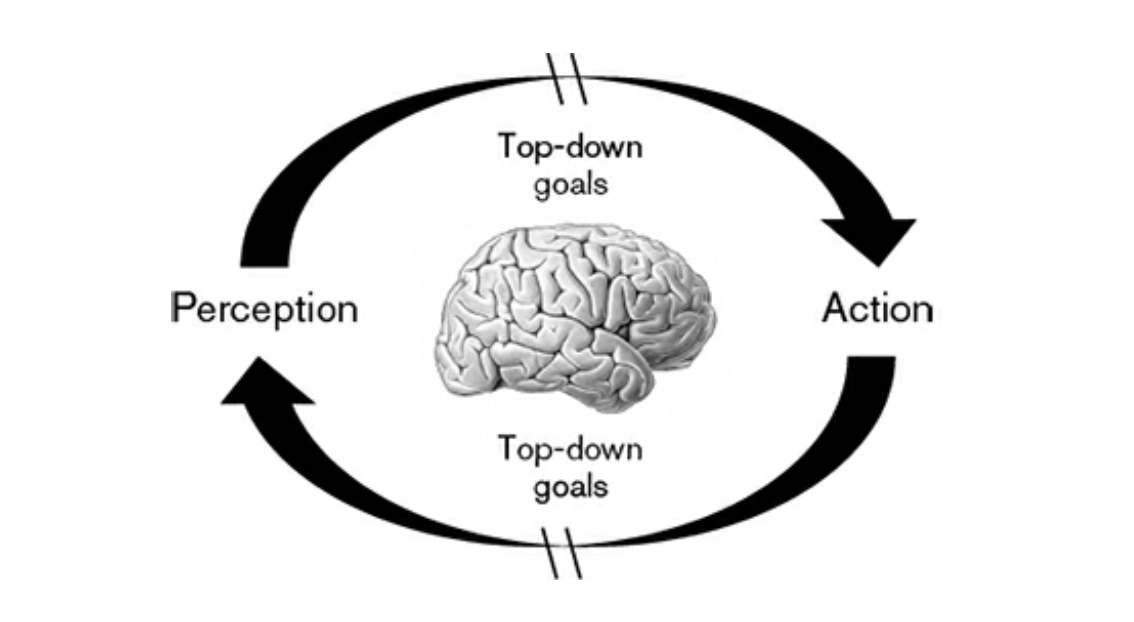It's human to pause

A while back I wrote on my whiteboard in big letters:
BE LESS REACTIVE.
Why are so many people reactive nowadays? The only constant on the Internet seems to be the outrage and blindly reacting to whatever others are doing. People reacting to politics, to celebrity gossip, to cat videos... It seems like a big chain of reactions, with no original action in sight.
We don't need more reactivity. We need more deliberateness and creativity because those two things are what got us out of the cave and into space.
So how to be less reactive?
One cycle to rule them all
All animals operate on a simple cycle:
Perceive → act.
Cat sees a bird, cat hunts the bird. Cats don't pause to consider whether the bird is an endangered species. Only we humans have that unique ability to interrupt the perception-action cycle, and choose not to pursue a short-term goal that is counter-productive in the long term.
Here's an excerpt from the Distracted Mind by neuroscientist Adam Gazzaley:
This most remarkable milestone in our brain’s evolution, the insertion of a break in the perception-action cycle, can be conceptualized more appropriately as a time delay between perception and action—a pause. During this pause, highly evolved neural processes that underlie our goal-setting abilities come into play—the executive functions. These abilities of evaluation, decision making, organization, and planning disrupt the automaticity of the cycle and influence both perceptions and actions via associations, reflections, expectations, and emotional weighting. This synthesis is the true pinnacle of the human mind—the creation of high-level goals. —Adam Gazzaley; Larry D. Rosen, The Distracted Mind (p. 23)

The ability to pause makes us human. We have the opportunity to choose how we react, or if we do at all. And it strikes me that fewer and fewer people actually exercise this uniquely human ability.
So that is what I try to do more of every day. Distracted? Pause. Thrown off by something? Pause. Feeling an urge to do something I might regret? Pause.
Of course, one way to practice this type of pausing is by meditating. I used to meditate more consistently and still sit down for 10-15 minutes every now and then, and every time I do, it makes me more deliberate.
You see, meditation is largely about becoming aware of thoughts and letting them go. It's a practice of perceiving, and letting go. Imagine one of those tennis cannon machines, but instead of tennis balls it's your thoughts flying at you, generated constantly by your own mind. If you think that you need to capture all the ideas and do something with them all, you're going to have a terrible time. It's too much.
However, if you let the ideas that aren't relevant just pass through and go back to the subconscious mind, then you can better pick the ideas that are just right, that make sense in your specific circumstance, right now. The more flexible you are about letting ideas go, the better you become about spotting and capturing the ideas that are just right.
But back to pausing. Only when you pause and take a step back do you see thoughts for what they are: malleable suggestions of direction. Each thought is a mere suggestion, until we solidify it with action. Pausing reminds us of that, and in doing so, it makes us more adaptable and creative. We are able to reject the suggestions that don't matter and get to the ones that do. And that is what being deliberate is about: not blindly jumping from one suggestion to another like a caffeinated squirrel in a garden full of nuts. Don't be a squirrel, be a human and pause.
-->